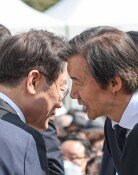Korean traditional music wins empathy with Polish people
Korean traditional music wins empathy with Polish people
Posted December. 08, 2014 04:45,
"Gugak has a resonance that heals the spirit of listeners. It was also the most popular music that captivated the audiences at top European music festivals.
Maria Pomianowska, artistic director of Cross Culture Festival in Warsaw, said that she would hold a special program featuring Gugak in the 11th Cross Culture Warsaw Festival next year featuring Gugak, titled Focus on Korea. The Warsaw festival, the largest music festival in Poland, which draws 10,000 to 20,000 people each September, had featured South American or African continental sections, but reportedly this will be the first one to focus on just one country. We met her at the Korean Culture Center in Warsaw, Poland.
How has a prestigious music festival in central and eastern Europe become entranced by Gugak? In 2012, when we invited the Gugak singing master Ahn Suk-seon, the 2,000-odd people were mesmerized by the Heungbuga. The modern original Gugak duo Soom was cited the Best performance team in 2014 in Warsaw. Focus on Korea is simply accepting the demands of the audience who want to see more Gugak performances.
A professor at Poland Ethnic Music Department at the Academy of Music in Cracow, Pomianowska said ethnic Polish music has much in common with Gugak. The folk dancing tune mazurka, which dates back to the 12th century, is similar to the triple beat used in Gugak. Just as the Korean traditional scale has five chords, Polish traditional music also uses mainly the pentatonic scale. The Polish professor said that two nations spiritual aspects are similar, possibly due to having endured a painful history of frequent foreign invasions.
I first heard Pansori when I came to Korea in 1996 and cannot forget the way it shook me up, she said. She is a Gugak aficionado who also plays the traditional Korean string instruments of ajaeng and haegeum. In a pink modernized hanbok, traditional Korean attire, to the interview, she said she purchased it when attending the Jeonju International Sori Festival in October.
"At the world music fair, which demonstrates the trends in global folk music, people have been highly impressed by Gugak and expressed interest. Koreans should be proud of having this highly sophisticated traditional music. In next years festival, I am eagerly anticipating the performances of Noreum Machi and Geomungo Factory, popular modern Korean gugak performers," she added.







